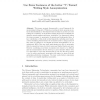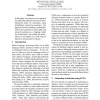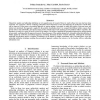120
click to vote
ACL
2012
13 years 4 months ago
2012
Authorship attribution deals with identifying the authors of anonymous texts. Building on our earlier finding that the Latent Dirichlet Allocation (LDA) topic model can be used t...
142
click to vote
PET
2012
Springer
13 years 4 months ago
2012
Springer
This paper presents Anonymouth, a novel framework for anonymizing writing style. Without accounting for style, anonymous authors risk identification. This framework is necessary t...
158
Voted
ESORICS
2011
Springer
14 years 2 months ago
2011
Springer
Program authorship attribution—identifying a programmer based on stylistic characteristics of code—has practical implications for detecting software theft, digital forensics, a...
117
click to vote
ACL
2010
15 years 16 days ago
2010
In this paper, we present a novel approach for authorship attribution, the task of identifying the author of a document, using probabilistic context-free grammars. Our approach in...
109
Voted
FTIR
2006
15 years 2 months ago
2006
Authorship attribution, the science of inferring characteristics of the author from the characteristics of documents written by that author, is a problem with a long history and a...
112
click to vote
LREC
2010
15 years 3 months ago
2010
Subjectivity analysis and authorship attribution are very popular areas of research. However, work in these two areas has been done separately. Our conjecture is that by combining...
135
click to vote
COLING
2008
15 years 3 months ago
2008
Most studies in statistical or machine learning based authorship attribution focus on two or a few authors. This leads to an overestimation of the importance of the features extra...
115
click to vote
CIARP
2006
Springer
15 years 6 months ago
2006
Springer
Authorship attribution is the task of identifying the author of a given text. The main concern of this task is to define an appropriate characterization of documents that captures ...
112
click to vote
COMPSAC
2009
IEEE
15 years 7 months ago
2009
IEEE
Authorship attribution is used to determine the creator of works among many candidates, playing a vital role in software forensics, authorship disputes and academic integrity inve...





